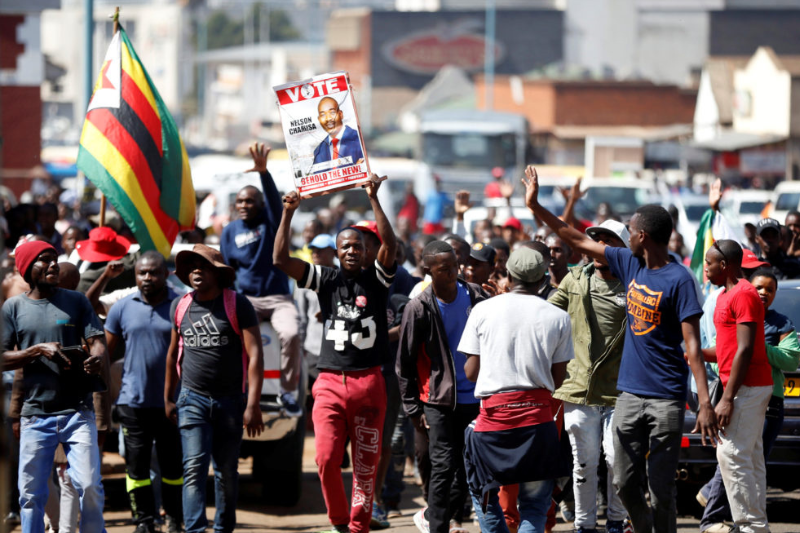Election officials in Zimbabwe, where President Emmerson Mnangagwa is running for a second and last term in a nation with a history of violent and contentious elections, extended the voting period till Thursday amid delays of up to ten hours in primarily opposition strongholds. Voting was suspended in several polling places in Zimbabwe on Wednesday night due to chaotic situations caused by ballot papers that were delivered up to ten hours late. This was especially the case in large urban areas like the capital, Harare.
Voter intimidation and shouting broke out at the Haig Park Primary School polling station in Harare on Thursday morning after voters were advised to return because there were no more ballots available for the local council elections. A group of people who had been waiting since the early hours of the morning exclaimed, “We are not going anywhere; we will sleep here.”
Voting was supposed to end at 7 p.m., but some stations still hadn’t received ballots. “These hours won’t kill me, and I waited five years to vote,” declared Cathrine Nyakudanga, who was carrying her six-month-old child on her back. When she came at 7 a.m., ballots hadn’t come for over nine hours. “It hurts to witness women and the elderly go through extended periods of time without food or drink. Popular local gospel singer Stanley Gwanzura stated, “That’s not safe. Those in line ahead of them started fires to cook meat for supper.
Since the overthrow of longstanding ruler Robert Mugabe in a coup in 2017, there have been two national elections. There are twelve contenders for president, but the primary matchup is anticipated to be between Mnangagwa, popularly known as “the crocodile,” who is 80 years old, and Nelson Chamisa, the opposition leader, who is 45. In a contentious election in 2018, Mnangagwa defeated Chamisa by a slim margin.
With this move, Chamisa seeks to end the 43-year ZANU-PF party rule. Ever since attaining independence from the control of the white minority in 1980, Zimbabwe has only had two leaders. If no candidate secures a definite majority in the first round of voting, a runoff election will take place on October 2. The election also determines the makeup of the 350-seat parliament and nearly 2,000 local council seats.
In a Harare working-class township, Basil Chendambuya, an early voter, said, “It’s getting harder to survive in this country. I’m hoping for a shift. I’m casting my third ballot, and I’m fervently hoping that this one counts. He claimed that his two adult children are living “hand to mouth” and working menial jobs.
The 15 million-strong nation in southern Africa is rich in mineral resources, including the greatest reserves of lithium in Africa, which is essential for producing batteries for electric cars. However, critics have long claimed that widespread corruption and poor governance have severely limited the nation’s potential.
Keep Reading
Around 30% of polling places in Harare experienced major delays in opening, according to top election observer for the European Union Fabio Massimo Castaldo, who informed reporters that this was frequently due to a shortage of necessary supplies, “notably, in many cases, paper ballots. ” The opposition’s bastion of metropolitan areas is where the delays are “disproportionately concentrated,” according to the non-governmental organization Zimbabwe Elections Support Network.
Nevers Mumba, the leader of the regional observation team for the Southern Africa Development Community, told reporters, “This is very strange. Voter packets were delivered late at several polling places, which the Zimbabwe Electoral Commission confirmed and attributed to printing difficulties “arising from numerous court challenges. Activists from the opposition and the ruling party had filed a flurry of cases regarding who could run in both the presidential and parliamentary elections.
While claiming intimidation in rural regions, Chamisa advised his supporters to exercise patience. He declared, “We are going to win this election. They are panicking because they know it.” Human Rights Watch and Amnesty International, among other opposition and rights organizations, charged Mnangagwa with trying to stifle dissent ahead of the election amid mounting tensions brought on by a currency crisis, high price increases for food, a deteriorating public health system, and a dearth of formal jobs.
Following the vote, Mnangagwa declared his certainty of victory. “I will be foolish if I think I won’t take it,” he remarked. He urged everyone to live in harmony. Mugabe’s close associate, Mnangagwa, held the office of vice president prior to a split that led to the coup in 2017. Although he has made an effort to present himself as a reformer, many believe that he is actually much more oppressive.
For the past 20 years, Zimbabwe has been subject to sanctions from the US and the EU due to claims of violations of human rights, which the ruling party has refuted. Mnangagwa has largely adopted Mugabe’s rhetoric against the West, in which he accuses it of attempting to overthrow his government. On election day, the Carter Center, which the government had invited to monitor the polls, reported that thirty of its forty-eight-member team of observers had not received accreditation.
A number of local human rights advocates, including attorneys and a minister who was thought to be critical of the administration, were also refused permission to witness the vote. The United States State Department denounced Zimbabwe’s decision to refuse them and many foreign journalists accreditation.

